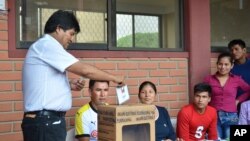Bolivian President Evo Morales looked headed for defeat in a referendum on whether the leftist leader can seek a fourth term in office, according to exit polls and early results on Sunday.
Morales, 56, now serving his third term, was trying to change the constitution so he could run for re-election in 2019, potentially allowing the former coca grower to remain president until 2025.
Exit polls showed he may have lost the vote. An Ipsos poll had the "no" side at 52.3 percent and "yes" at 47.7 percent, while a Mori poll gave a narrower 51 percent to 49 percent lead to the "no."
Early official results had the "no" side winning with 66 percent of votes, although that covered only 3 percent of returns. Turnout had been very high, at nearly 88 percent, according to the electoral commission.
If the result is confirmed, it would be another blow for South American's once dominant populist leftist movement that has suffered a series of recent electoral defeats across the continent.
Morales, Bolivia's first indigenous president, has been credited with slashing poverty in one of the region's poorest countries by spending a natural gas windfall on welfare programs and new infrastructure since taking office in 2006. He was re-elected in 2014 with 61 percent of the vote.
But a growing body of critics charge Morales' administration with corruption, waste and authoritarianism. Recent allegations about an ex-girlfriend whose company won lucrative government contracts have weighed heavily on his popularity.
In a middle-class neighborhood in a southern district of La Paz, 37-year-old Susana Macias said she was voting "no" as a form of rebellion.
"We feel we have been tricked. The people who are leading us are not who we thought they were," she said.
Even if he loses the referendum, Morales has plenty of time before the next election to pick a successor and otherwise influence Bolivia's future, said Michael Shifter, head of the Washington-based Inter-American Dialogue think tank.
"He is one of the most charismatic and powerful leaders in Bolivian history. It is unlikely he is going to just retire from politics," he said.
"But perhaps for the first time in a decade, it is possible to imagine a Bolivia without Evo that does not return to the old times of economic and racial exclusion," Shifter said.
